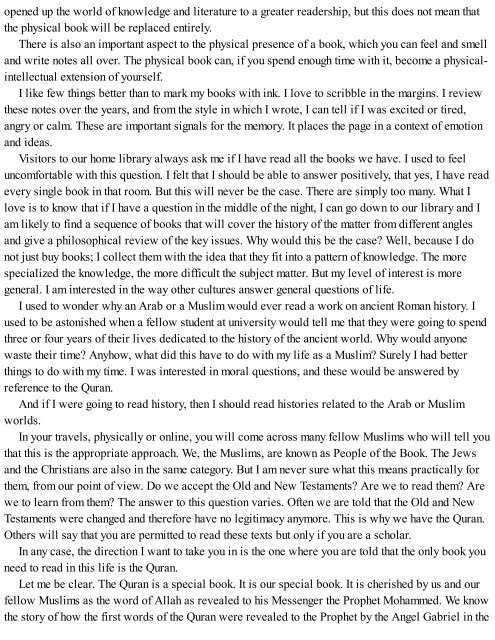1250119847
You also want an ePaper? Increase the reach of your titles
YUMPU automatically turns print PDFs into web optimized ePapers that Google loves.
opened up the world of knowledge and literature to a greater readership, but this does not mean that<br />
the physical book will be replaced entirely.<br />
There is also an important aspect to the physical presence of a book, which you can feel and smell<br />
and write notes all over. The physical book can, if you spend enough time with it, become a physicalintellectual<br />
extension of yourself.<br />
I like few things better than to mark my books with ink. I love to scribble in the margins. I review<br />
these notes over the years, and from the style in which I wrote, I can tell if I was excited or tired,<br />
angry or calm. These are important signals for the memory. It places the page in a context of emotion<br />
and ideas.<br />
Visitors to our home library always ask me if I have read all the books we have. I used to feel<br />
uncomfortable with this question. I felt that I should be able to answer positively, that yes, I have read<br />
every single book in that room. But this will never be the case. There are simply too many. What I<br />
love is to know that if I have a question in the middle of the night, I can go down to our library and I<br />
am likely to find a sequence of books that will cover the history of the matter from different angles<br />
and give a philosophical review of the key issues. Why would this be the case? Well, because I do<br />
not just buy books; I collect them with the idea that they fit into a pattern of knowledge. The more<br />
specialized the knowledge, the more difficult the subject matter. But my level of interest is more<br />
general. I am interested in the way other cultures answer general questions of life.<br />
I used to wonder why an Arab or a Muslim would ever read a work on ancient Roman history. I<br />
used to be astonished when a fellow student at university would tell me that they were going to spend<br />
three or four years of their lives dedicated to the history of the ancient world. Why would anyone<br />
waste their time? Anyhow, what did this have to do with my life as a Muslim? Surely I had better<br />
things to do with my time. I was interested in moral questions, and these would be answered by<br />
reference to the Quran.<br />
And if I were going to read history, then I should read histories related to the Arab or Muslim<br />
worlds.<br />
In your travels, physically or online, you will come across many fellow Muslims who will tell you<br />
that this is the appropriate approach. We, the Muslims, are known as People of the Book. The Jews<br />
and the Christians are also in the same category. But I am never sure what this means practically for<br />
them, from our point of view. Do we accept the Old and New Testaments? Are we to read them? Are<br />
we to learn from them? The answer to this question varies. Often we are told that the Old and New<br />
Testaments were changed and therefore have no legitimacy anymore. This is why we have the Quran.<br />
Others will say that you are permitted to read these texts but only if you are a scholar.<br />
In any case, the direction I want to take you in is the one where you are told that the only book you<br />
need to read in this life is the Quran.<br />
Let me be clear. The Quran is a special book. It is our special book. It is cherished by us and our<br />
fellow Muslims as the word of Allah as revealed to his Messenger the Prophet Mohammed. We know<br />
the story of how the first words of the Quran were revealed to the Prophet by the Angel Gabriel in the
















